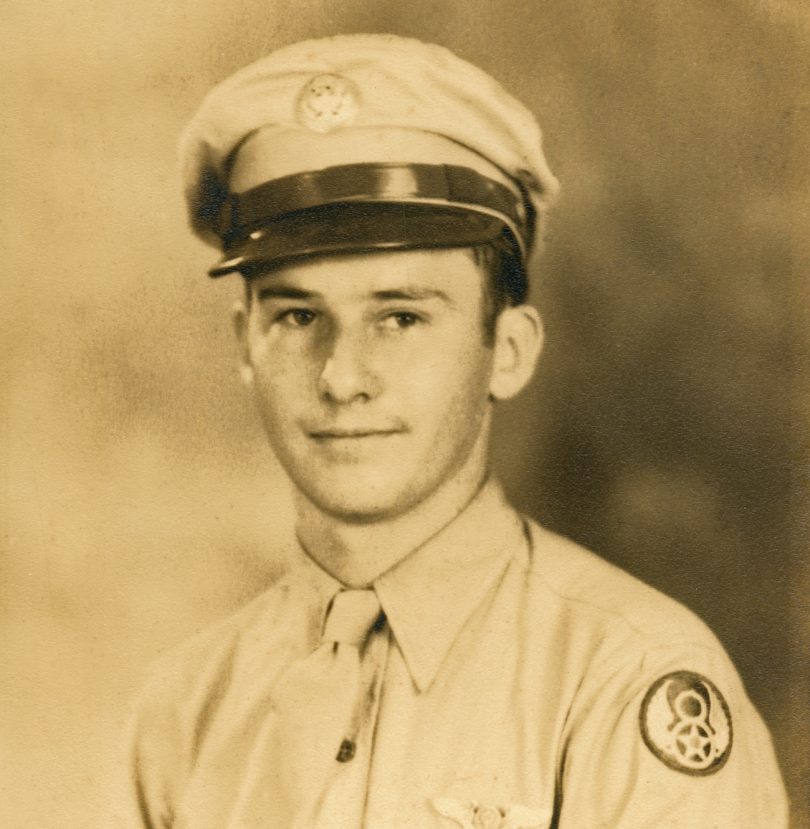I’ve had many opportunities in my 20-plus years in public relations, and plenty of stories to go with them. Luckily, I have a family member with whom I can share every high and low.
My 94-year-old grandfather, C.B. Perdue, is retired from the U.S. Air Force, where he spent most of his career in public affairs. He flew aboard Boeing B-17 Flying Fortress bomber planes in World War II. Then, after his liberation from the Stalag Luft I prisoner of war camp, he spent 41 years in public affairs.
He’s seen it all, which is one of the many things I love about him. In honor of Veteran’s Day on Nov. 11, I asked him some questions about his career.
What did your time in the military teach you about communications and relationships?
The definition of a good relationship is trust. It took me a while to prove to my higher-ups that I was going to do things right. The good generals that I worked for had confidence in me. But the ones that were difficult to work with would try to second-guess everything we recommended. Some of them were obstinate just to be obstinate. But the majority of them trusted me to do my job, and that was important.
I was serving on Japan’s Okinawa Island in the 1950s and Gen. Douglas MacArthur came to meet my two-star general. My job was to get photos of him on-base. But every time Gen. MacArthur saw me raise my camera, he would turn away. Every time! None of my pictures were any good because he did not want his picture taken, for whatever reason. I didn’t know his motive, and he didn’t know me. Some communication would have helped us understand our respective missions, but that wasn’t going to happen. [laughs]
I always say that communication is key, both inside your team and externally with any audience. Do you agree?
Yes, and transparency [is key too]. When I was working at Brooks Air Force Base in San Antonio, we began a program of unannounced, random drug testing for the personnel. We soon started getting a lot of questions from the media. I recommended that we hold a news conference to allow everyone to ask their questions and get it all out there at once.
My general, a real nice fellow, agreed to my plan. He answered the reporters’ questions as completely and honestly as possible, but he didn’t linger in the room.
We cleared the air as much as we could. That’s one of the main things I learned: Tell everything you are at liberty to tell. Put it all out there when you can. The longer you keep giving out tidbits, the longer you will remain in the public eye.
If you could offer one piece of advice that could help a PR practitioner succeed, what would it be?
Just show up. Get into the field. Learn everything you can about what they’re doing internally and externally. Do your best and don’t be afraid to ask questions. I had to work with whatever the mission was. Sometimes it’s hard, but you’ve got to learn what that mission is.
Get a good education. But know that over time, you’re going to learn a lot more. Knowing your subject can be one of the most challenging aspects of communications. But when you do, then you can express it to people who need to hear about it and understand it. If you don’t know your subject, they won’t either.
You started your career in the 1940s, and now here we are, almost 80 years later. The way information is produced and consumed has changed vastly in those eight decades. Where do you predict it’s going next?
In the coming years, the roles of communicators will be completely changed. I don’t think newspapers will exist as we know them, and TV will be changed a great deal, too. Challenges for communicators will also be different. For example, reading the newspaper or seeing news on TV today, I can tell when someone has good knowledge of what they’re trying to convey. Unfortunately, I can also see when they don’t.
Journalism is supposed to tell both sides of the story well, to give you the information and let you decide how you feel about it. Now, though, they often skip the facts and tell you how they want you to feel about it. That’s not right. Unless it’s an opinion column, I don’t want a journalist to convince me of anything; I’ll make up my own mind.
Rachel Hedstrom, APR, is a senior consultant and director of content with The Gentry Agency, an award-winning boutique public relations agency in Dallas. She is a grateful American and proud military “brat” who enjoys highlighting her favorite World War II veteran, C.B. Perdue, through speaking engagements, media stories and storytelling on his website, www.b17chief.com. Contact her at rachel@thegentryagency.com.








Thank you for this wonderful article, Rachel. And thank your grandfather for his service to our country. As communicators, it would benefit us all to hear more stories like this. I also share your grandfather’s concerns regarding the state of today’s journalism industry.
Thank you for this article. Sage advice!
As a veteran, a former newspaper journalist, and a public relations professional, Mr. Perdue’s insight is music to my ears. Wonderful comments in every respect. We certainly hope more people — in and out of public relations — had the same understanding and wisdom. Thank you for sharing.
This is a really interesting take on our industry, Rachel. It goes to show that the fundamentals of public relations don’t really change. Building relationships based on trust and transparency will always pay off in PR. Students like me can learn a lot from these tried and true insights from an expert. – Zoie Mestayer, writer/editor of Platform Magazine